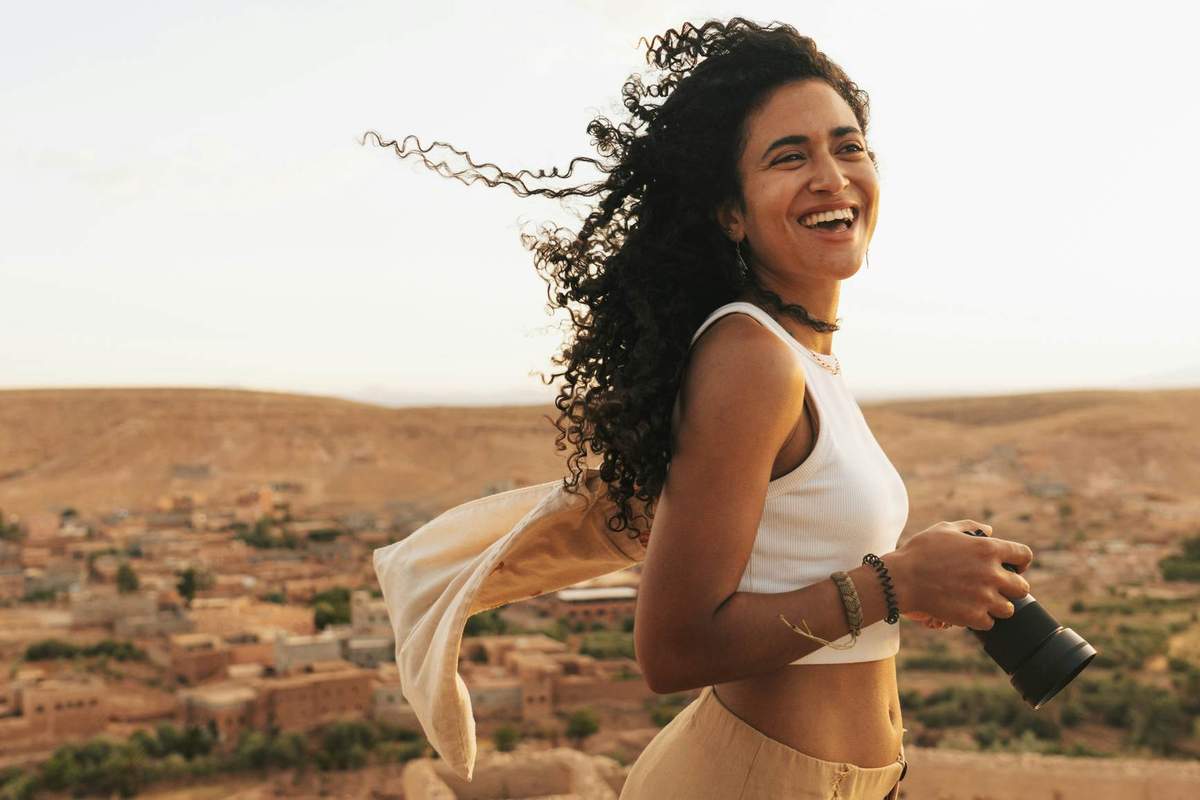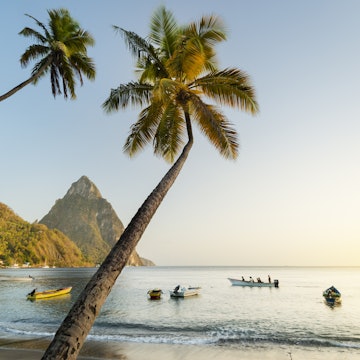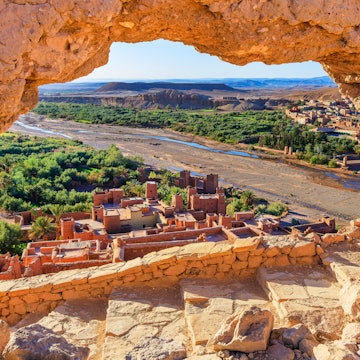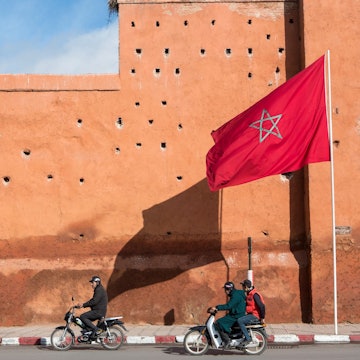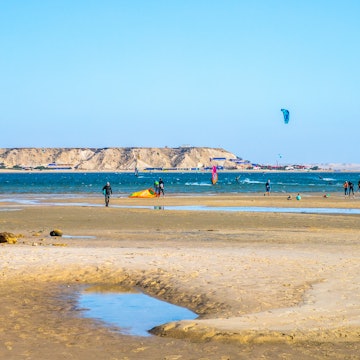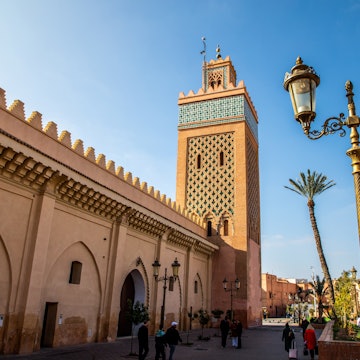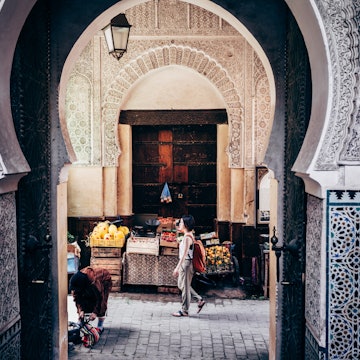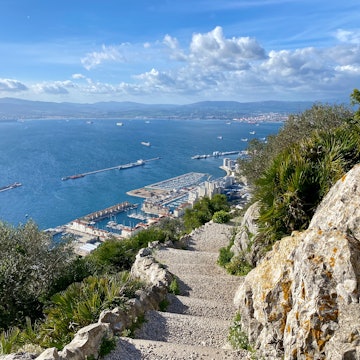
Copy My Trip: A bus tour through the cities of Northern Morocco

Jan 17, 2024 • 6 min read

Taking in the sights and sounds of Chefchaouen © Deepa Lakshmin
Lonely Planet social media director Deepa Lakshmin traveled to Morocco where she embarked on a bus tour that explored the flavors and attractions of the country's top cities. Here, she shares some tips and insights for anyone planning a similar trip.
Most people don’t pick Rabat as their first destination in Morocco.
Instead, they will opt for colorful Marrakesh, or perhaps Casablanca whose international airport welcomes flights from the US, Europe and across Africa. Yet, as the country’s capital, Rabat can give travelers a taste of everything Morocco has to offer.
The country, of course, is still rebuilding following the 6.8-magnitude earthquake that hit the country on September 8, 2023. The tremor affected parts of Marrakesh and devastated villages in the High Atlas Mountains, so traveling to Morocco right now is a good way to help support its recovery.
I flew from across the Atlantic to stay in Rabat for a few days. I then took a private car to Casablanca and joined a G Adventures bus tour to Chefchaouen, Fez and Marrakesh for a whirlwind week of tagines, mint tea and magical medinas that overloaded the senses.

What was the most touristy thing you did?
Visit Chefchaouen, the “blue pearl” of Morocco in the Rif Mountains, known for the blue-washed buildings of its old town. I took far too many photos in front of its blue doors, blue walls, blue steps, blue everything. The blue represents the sky, so watching the sunset or sunrise over the city is a must.
We had a rooftop dinner at Casa Aladin in the middle of Plaza Uta El Hammam with great views of the sea of blue rooftops. While more touristy restaurants usually offer alcohol, I visited near a religious holiday, Hijri (Islamic New Year), and had a hard time finding places that served alcoholic cocktails. Someone ordered a rosé and got a concoction of juice instead. That said, my freshly squeezed orange juice was excellent.
Favorite activity from the trip?
The only thing prettier than the Chefchaouen sunset is the sunrise. We woke at 4:45 am to hike up to the Spanish Mosque to watch the sun come up. It was a welcome sight to walk through the normally bustling medina in the quiet morning hours. The locals were just waking up and setting up shop. The walk was fairly well-lit with street lamps, and I was with three other women – one of whom spoke Arabic, which came in handy because one man did approach us but left us alone after she spoke with him – and a curious street dog followed us the whole way, falling asleep at our feet when we reached our destination.
How did you get around? How much did it cost?
G Adventures is a budget travel company, primarily for twentysomethings, that I’ve traveled with since my early twenties. I booked their ‘Northern Morocco: Blue Cities & Bustling Marrakesh’ 7-day tour, which cost US$692.55 after a 5% discount I got as a repeat traveler.
Our group only had 12 travelers, so our bus was actually a purple van with G Adventures’ logo plastered on the side. At least we could always find it in the parking lot! My upfront cost covered all transportation between cities as well as simple accommodation and breakfasts. Trip planning stresses me out, and I like outsourcing it to folks who know the countries better than I do.
With G, you get what you pay for – don’t expect luxe resorts or fancy transportation – but I don’t need much to enjoy the ride. (Maybe someday when I have a bigger budget, I’ll book a more premium tour with Elsewhere by Lonely Planet!).

Where did you stay? What was the vibe?
We stayed in 3-star budget hotels for the basics: a bed without bed bugs, an (occasionally) hot shower, and air conditioning that worked most of the time. Chefchaouen’s Hotel Madrid had the most memorable decor with Moroccan tiles throughout the halls and ornate mirrors.
Marrakesh’s Hotel Residence Amalou had a pool that my group and I – desperate for relief from the 100°F-plus heat – jumped in upon arrival. Fez’s Hotel Mounia had an outdoor terrace that was really just a bare-bones balcony with scattered chairs. It works for backpackers who aren’t spending much time in their rooms anyway.
In Rabat, the 5-star Fairmont La Marina Rabat-Salé was a much more upscale experience. It offered quiet luxury, a place to find calm. I also slept in until 2 pm one day because the jet lag hit hard – and the bed was that comfy. My shoulders finally relaxed with a swim in their infinity pool and some light bites on their rooftop bar. If that doesn't work for you, they’ve also got a spa.
I didn’t expect to eat sushi in Morocco, either, but the chef at their restaurant Le Deck specializes in Peruvian and Japanese fusion cuisine. It was so good, I ate it each day. The desserts here were over-the-top in appearance, texture and flavor, too – just how my sweet tooth likes them!

What was the most under-the-radar activity you enjoyed?
I was pleasantly surprised by Rabat. More tourists should add it to their itinerary, especially in July as coastal temperatures are much more bearable than at inland favorites like Marrakesh or Fez.
The city has a clear split between the old and the new on its side of the Bou Regreg river. The medina’s white walls look straight out of Santorini, while a leisurely boat ride floats past the rocket ship-like Mohammed VI Tower and massive Grand Theatre of Rabat, a glossy new amphitheater with walls sculpted to mimic the river’s waves. The city’s main sight, the Mausoleum of Mohammed V, is worth a walkthrough just to see the detailed zellige (mosaic tiles) and see where some of Morocco’s royal families were laid to rest. It’s free to visit, but keep in mind the area is still a sacred space, particularly during Ramadan, so make sure to dress and behave respectfully. I carried a scarf with me everywhere so I could cover up just in case.
Rabat is also much quieter than other cities. You aren’t brushing shoulders with strangers crammed into narrow streets. It’s a nice change of pace from Marrakesh and Fez.

Best tip for someone who wants to plan the same trip?
If you want to shop, put on your thick skin. Between the handcrafted rugs and walls of colorful ceramics, I wanted to take home all the souvenirs. But I’m a wimp when it comes to haggling, which is expected in traditional medinas like the one in Fez. I followed the golden rule from Lonely Planet’s guidebook and decided what the item was worth to me. I was then fair to the trader – and set that as my final price.”
What surprised you?
How quick it was to get to Morocco from New York City! The journey was under 7 hours each way between JFK to Casablanca. That’s quicker than a trip to Los Angeles. I flew Royal Air Maroc, which had a weirdly slow check-in process and less-than-tasty food, but there were no delays and my bag arrived in one piece, which is honestly all I hope for while traveling abroad. The direct flight makes it easy to rationalize another trip to see more of the country. Even if I can’t swing a full week, I’ve always been willing to go to LA for a long weekend, so why not Morocco?





